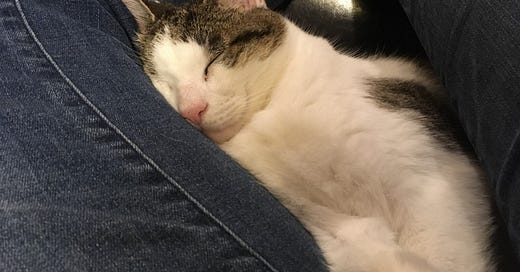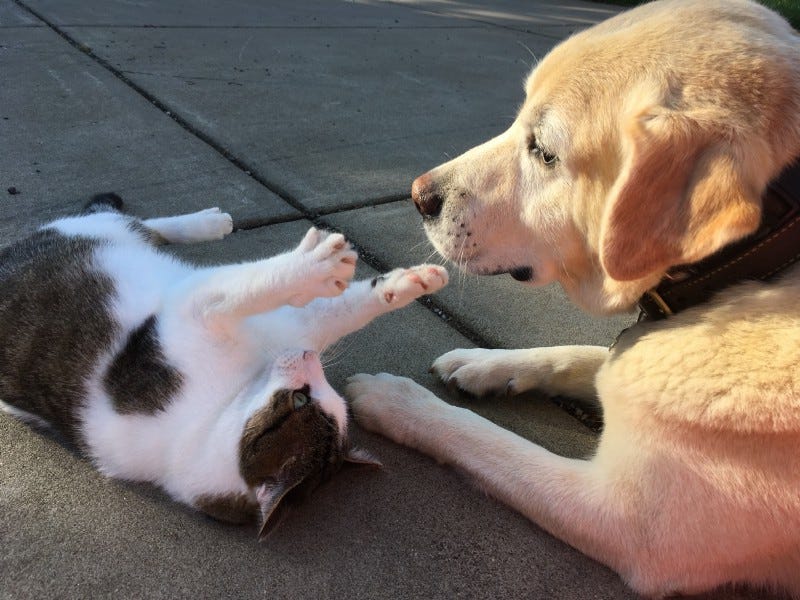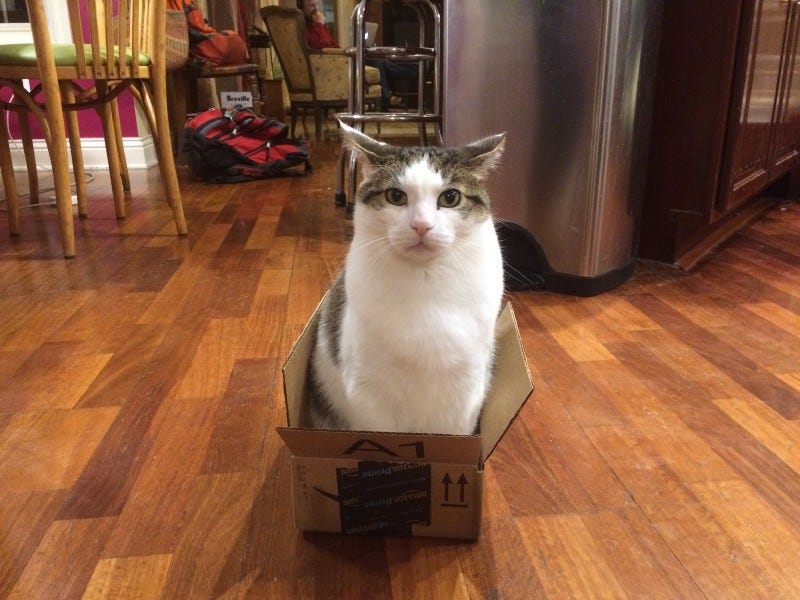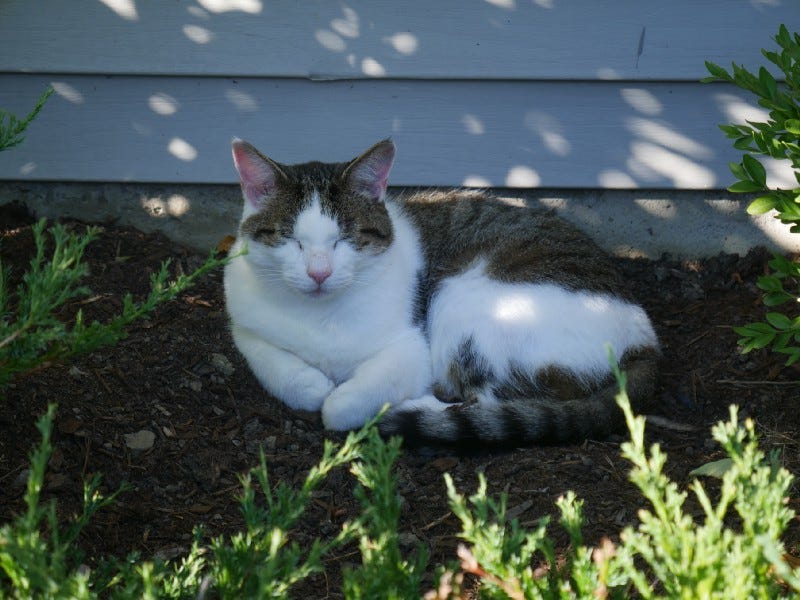How can euthanasia be so right yet feel so wrong?
I sit in my closet watching Chips’s striped, furry sides lift and fall with each breath. He is curled up in a box in such a way that I can’t see much of his face or his front paws, so I can almost believe that all is well.
Except that I am breathing through my mouth. The stench from his corroded, cancer-filled jaw fills this cramped space. I don’t want to smell the fetid air around me, but I also don’t want to leave him in here alone.
Not for his last hour.
It feels wrong, this knowing when he will die. None of us should be able to say with any certainty when our loved one will leave us. Just like none of us should know the exact moment of birth. There should be mystery in the comings and goings of life, a blessed uncontrollable ignorance.
My husband and I often remark on how fortunate we are as parents that we don’t know when we’re experiencing “the last.” The last time your child needs help zipping up a parka, the last time she holds your hand crossing a street, the last time you tuck him into bed and sing him to sleep.
Not knowing is one of life’s great blessings.
Euthanasia disrupts that ignorance, dispels the mystery. Euthanasia is clinical and exact: the day and time are chosen. Unless fate intervenes, the end is certain. There will be no sudden turnaround, no miracle recovery.
I’ve known this day was coming for weeks, and it hasn’t made anything easier. If anything, it made it harder.
When I was told that Chips had just a few months to live, I was stunned. I put him back into his carrier, paid the vet’s bill, placed him on the passenger seat of my car, and sobbed into my steering wheel.
How could this be? Our indestructible cat? The One Who Could Not Be Stopped? He spent his life busting out of screen doors, breaking through plexiglass, and flying out of second-story windows. He wrangled with raccoons, slew (and ate the majority of) all manner of rodents in the fields near our house, and turned our back deck in the summer into an involuntary mouse organ donor bank.
I drove home, allowing myself to cry while at the same time questioning this death sentence. Surely there was something that could reverse or markedly slow down the growth of his cancer? After all, Chips was invincible, wasn’t he?
From the time my mother died of lymphoma exactly 30 years ago, I had been slowly amassing a decent body of knowledge about alternative healing. I’d used that knowledge to help my family and friends find relief from various ailments, from the banal (cold and flu, bumps and bruises, etc.) to the more serious and elusive (cancer, chronic fatigue, chronic pain).
Considering myself an amateur holistic healer of sorts, I had always felt fairly confident that there was always something — some remedy, herb, tincture, supplement, modality…some diet or change in lifestyle or belief system — that could bring about healing. It was out there; I just had to find it.
By the time I pulled into our driveway, I had pulled myself together. It’s just some growth in his mouth, I thought. I opened the door of the carrier and he bounded away. Chips and I were not giving up.
I found a different vet, one who had a more alternative-minded outlook and embraced my optimism. I changed Chips’s diet, squeezed a dropperful of pungent-smelling herbal tincture down his throat every day, and did my own version of Reiki on him.
But despite those and other efforts, at the next appointment with the wonderful new vet, she confirmed what I had suspected: his tumor had grown. Substantially. With eyes filled with tremendous kindness, she said the one thing I did not want to hear: “There’s nothing we can do.”
He has spent most of the day in this box, in this closet. I stroke his head gently between his ears, and he purrs. I tell him I love him, that he’s such a good kitty. I keep checking my watch, unable to do anything but gaze at him.
He’s here. Now. Alive. In an hour, he’ll be gone — because I made a phone call yesterday: yes, tomorrow at 7:00pm works for us.
I played God for a moment and I don’t like it one bit.
I love this cat. I love his gale-force will, his calm equipoise, his steely green eyes. I love how he kept our then-teenage daughter company during her chronic illness, a true comfort and companion when she was in dire need of both.
I love how he would play with our dog on the driveway, lying on his back, batting Samson’s face with soft paws in the afternoon sun.
I love how goofy he looked with his pink ear and his splattered colorings: a tiny, ridiculous cow stalking his prey in the green grass.
I love how he’d sit on the edge of the tub while I took a bath, crouching lower and lower to drink, then finally placing one paw strategically on my clavicle to get just close enough to lap up the warm water.
I love how he’d reach his paws up past my knee in the morning to get a piece of sliced turkey as I made sandwiches, even stretching high enough to hang from the drawer handle, back feet aloft.
But most of all, I love that we could not keep him inside, that we could not stop him from living his life on his own wild, voracious terms.
The snow started falling yesterday, and the temperatures were following suit. We knew that the ground would soon freeze over, so if we were going to bury Chips, we had to dig the hole immediately. My son and husband headed out into the cold evening, shovels in hand.
It felt macabre to dig the hole while he was still with us, a ghoulish act of expediency. It seemed wrong, yet what other choice did we have? Calling the mobile vet to come to our house and put Chips to sleep felt wrong, too. Should we just let nature take its course? Let him starve?
Over the past few weeks I’ve watched helplessly as he comes running for food but then can’t consume it. Every day he has become less and less able to drink, eat, swallow. What seemed like such a small issue, is not. His mouth, the one sensory organ essential to feline life, is failing him.
His once-snow-white paws and chest are now dark, blood-stained and smelly, the fur matted with stringy saliva. He needs assistance to drink water. He is clearly in pain.
The one thing I can do, the only act of healing I can perform, is to take away his pain… along with his life.
I sit with him in the closet, watching him as he sleeps fitfully. Every now and then he presses his swollen jaw into the edge of the cardboard box, seeking relief. He fits into the box perfectly.
He has always loved boxes, from the moment we brought him home from the shelter. Was it because he and his big orange brother Frito had been dropped off anonymously to the shelter in a Frito-Lay box?
I don’t know. But over the years he has commandeered boxes of all shapes and sizes, including ones he could barely fit into.
Unbidden, a thought: we will have to bury him in a box such as this. Guilt immediately drives the idea from my mind, and I hate myself for having it, even briefly.
The doorbell rings and my heart tightens. It’s seven. Maybe I should have waited just one more day? My husband answers the door, and Chips and I both emerge from the closet.
The vet, a family acquaintance and compassionate soul, greets me with somber warmth. He assures all of us that we are doing the right thing at the right time, freeing Chips from the pain of his downward trajectory. I nod, so wanting to believe.
I sit on the couch and hold Chips on my lap, petting him and talking to him. He’s suspicious, and I can feel the tension in his body. As soon as he feels the pinch of the sedative, though, his intuition kicks in. He knows.
He struggles with me, fighting to leave my arms. I feel horrible. He squirms and wrestles and I can barely hold onto him. In desperation, I look to my son for help. “Can you hold him?”
He takes Chips from me and takes my place on the couch. I get close to Chips’s face so that I can look into his wild eyes and talk directly to him. He looks completely panicked. With my hand stroking his head, I keep telling him,“It’s okay, Chipsy. You’re safe.” Over and over and over.
In his eyes I read betrayal. Am I lying to him? His instincts are true; his life is in danger. And then I feel my husband’s hand on my back, and it gives me comfort and strength. No, I’m not lying. It IS okay. The eternal part of Chips IS safe.
I keep reassuring, keep stroking Chips’s head, and in what feels like hours but was really just minutes, my son says, “He’s calming down. His heart isn’t racing anymore.”
We can see it. My son relaxes his grip and Chips stays there, on his own. His eyes have a far-away look in them and his lids are heavy. We all say goodbye, telling him what a wonderful cat he’s been, and that we love him.
And then, with my hand still on his head, the vet administers the final injection. Chips’s head lowers, lowers… until it rests between his paws.
“He’s gone,” says my son, who can feel the stillness of Chips’s heart. The vet listens with a stethoscope, and nods. I break down.
The next day, I find myself replaying in my head the last moments of his life. My son and I talk about it, how we felt treasonous in that moment of struggle, like an accessory to a crime. Yet we agree that we also feel relief knowing that he’s not starving anymore, not in constant pain.
This is the inherent conundrum of euthanasia, I decide. It is good and merciful, but it is not without its own pain.
It is an undertaking of complete love, a love so large that it can absorb everything, the light and the dark. It is a love so powerful it can even absorb — and absolve — the guilt induced by the very act of ending the life of one you love.
This is what I tell myself, anyway.
I miss Chips. I miss his jumping up on the sink while I’m brushing my teeth, demanding a drink from the faucet. I miss his bounce as he trots out of the meadow toward me. I even miss his needing-to-be-clipped claws, kneading and needling my lap while I type at the computer.
I keep thinking I’ll see him at the back door, meowing to be let out. But then I remember: we never could keep him inside.
To support my writing, please click the clapping symbol below (the more you click, the more you clap), share with others, or FOLLOW me here on Medium…
Thank you!
Mary








